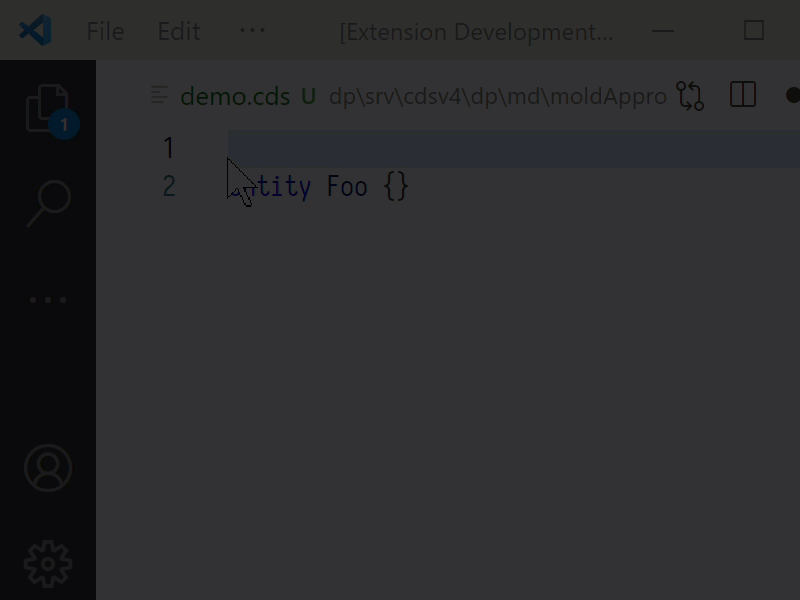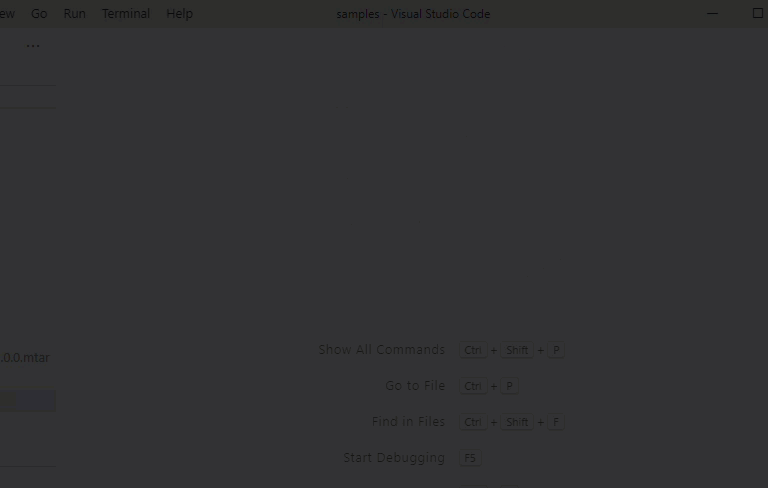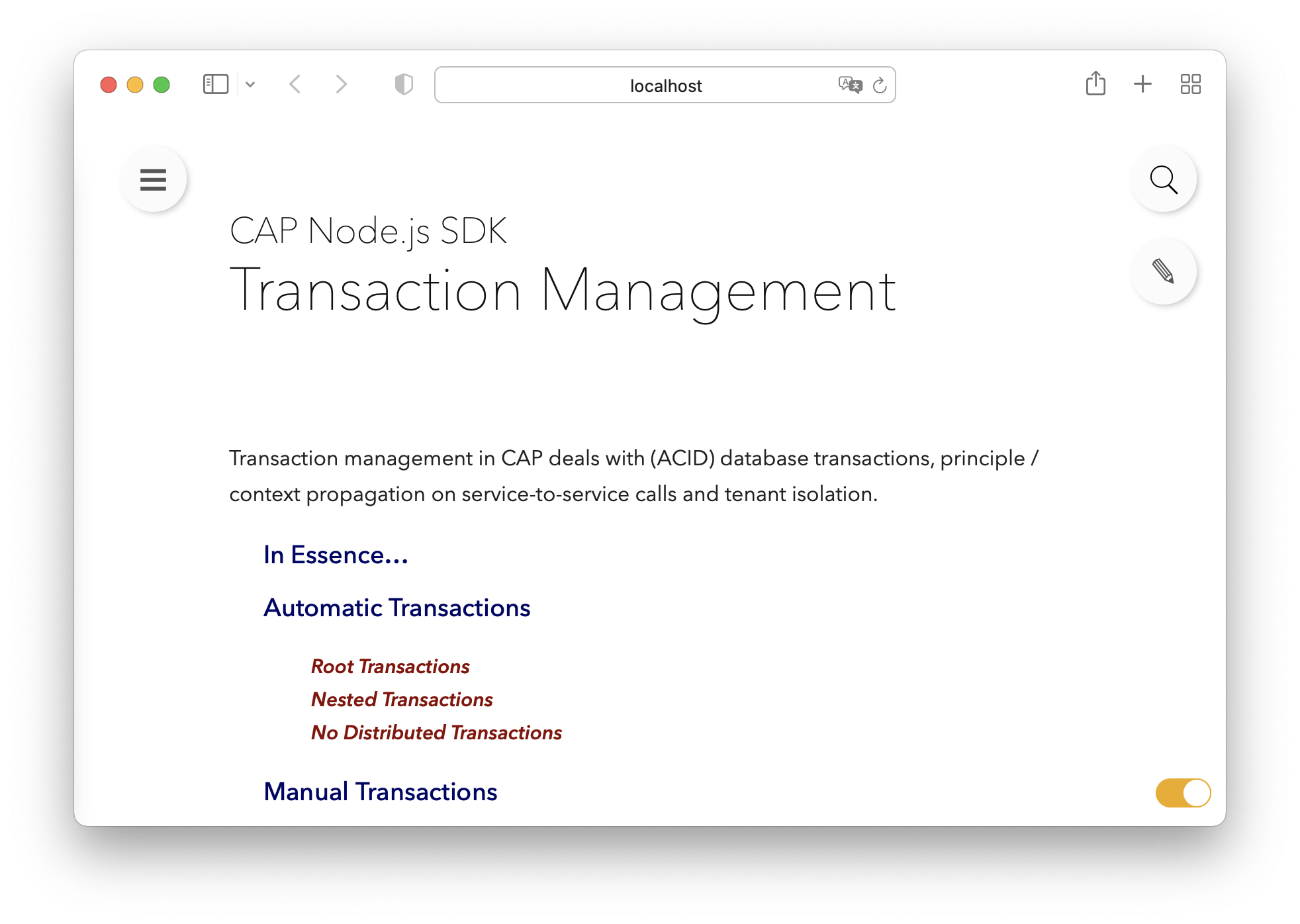October 2021





Best Practices for Testing
We provide best practices and recommendations for testing in Node.js and in Java.
With the cds.test toolkit, you can now easily write tests for your CAP Node.js application:
const {GET, expect} = cds.test('@capire/bookshop') // starts the server
const {data} = await GET `/browse/Books` // sends a request
expect (data.value).to.eql(...) // checks the responseConsuming Services General Available
Consuming OData V2 and V4 services from CAP applications is now general available.
Read It: Consuming Services Cookbook
The new and revamped Consuming Services Cookbook shows you how to import external service definitions, mock, call, and mash-up with remote services. The cookbook also explains how to connect to remote services and the specifics for the deployment of your CAP application.
Consuming OData V2 Services in Node.js
You can consume OData V2 services with Node.js, by setting kind to odata-v2.
package.json:
"cds": {
"requires": {
"API_BUSINESS_PARTNER": {
"kind": "odata-v2",
"model": "srv/external/API_BUSINESS_PARTNER",
"credentials": {
/* ... */
}
}
}
}TIP
The cds import command automatically adds a section with the right value.
Import External Service Definitions as CDL
You can import external service definitions as CDL file (*.cds) for better readability.
cds import ~/Downloads/API_BUSINESS_PARTNER.edmx --keep-namespace --as cdsThis new option will become the default in a future release.
Notable Changes From the Beta Version
- With the new version of
cds import, associations are declared without keys explicitly to solve runtime issues. - More Querying API and Projection features are supported.
Command Line & Tools
Linting CDS Models
CDS Lint helps you to catch issues in your CDS models early. It is built on top of the standard ESLint framework and integrates with many popular IDEs.
With this release, we provide an initial set of rules. In future releases, we will add more rules and provide APIs, that help you to write your own rules.
Improved Support for Doc Comments
The editor now automatically adds end marker and when line breaking starts the new line with a * vertically aligned.

CDS Editors Speedup: Additional Options
The following applies to CDS editors in SAP Business Application Studio and Visual Studio Code.
We improved the calculation of workspace symbols. Give it a try.

The translation support was optimized with regards to indexing and revalidation.

The workspace scanning for CSN files has changed. The user setting
cds.workspace.scanCsnhas now three options:Options Description OffCSN files won't be scanned. ByFileExtensionDefault. Only CSN files with file extensions .csn or .csn.json will be scanned. InspectJsonAdditionally all .json files will be inspected if they contain CSN. With the new default, most CSN files are included in a fast way in workspace symbols.
Merged @sap/cds-sidecar-client Package
We merged the former package @sap/cds-sidecar-client into @sap/cds-dk.
As @sap/cds-sidecar-client was always an internal package, this should not affect you. Yet, if, for any reason, you had @sap/cds-sidecar-client in your list of dependencies, you should remove it.
Node.js Runtime
Important Changes ❗️
- In Improved Transaction Handling we had to make two changes that may affect your project → see the warning below.
- We Cleaned up
cds.qlincluding a few undocumented API variants. - The data returned by custom handlers now has precedence over the values in the database, which are - as required by the OData specification - retrieved in the OData protocol adapter after a write operation. This allows to control exactly which data gets returned to the client.
Improved srv.tx()
Transaction handling was thoroughly cleaned up and improved in this release, and at last also documented end-to-end in Node.js > srv.tx — Transactions.
To highlight only a few fixes and additions you should take notice of:
Method
srv.tx()now allows specifying tenants and users as plain strings:Method
srv.tx()now allows running functions in managed transactions:New method
cds.spawn()guarantees properly isolated background jobs:Properties
cds.User.tenantandcds.User.localeare deprecated.Fully Managed Transactions → method
srv.tx(req)is deprecated.Automatic Context Propagation: calling
srv.tx({...})now inherits fromcds.contextby default. This shortcuts the 99% cases.Protection against dangling connections: calling
tx.commitortx.rollbacknow disallows subsequent queries by default. Before, any accidential subsequent query began a new transaction, but this time without automaticcommit/rollback. This in turn lead to hard-to-detect dangling connections, drained connection pools, and servers not responding anymore.
WARNING
The last two fixes changed existing behavior, yet is very unlikely to affect your project. Nevertheless if it does, you can restore the former (rather erroneous) behavior by setting cds.env.features.cds_tx_inheritance = false or cds.env.features.cds_tx_protection = false respectively.
Cleaned up cds.ql
After merging the runtime packages in the July Release, we merged various sources of the QL implementation and, in the process, removed the following unofficial variants:
Unofficial variant
SELECT({'expand(foo)':['a','b']})is not supported anymore → use one of these official APIs for expands instead:jsSELECT(x => { x.a, x.foo (f =>{ f.b, f.c }) }) SELECT(['a',{ref:['foo'], expand:['b','c']}])Unofficial variant
SELECT.orderBy('foo','desc')is not supported anymore → use one of these official APIs instead:jsSELECT.from(Foo).orderBy({foo:'desc'}) SELECT.from(Foo).orderBy('foo desc')Unofficial variant
SELECT.orderBy('foo, bar desc')is not supported anymore → use one of these official APIs instead:jsSELECT.from(Foo).orderBy({foo:1,bar:-1}) SELECT.from(Foo).orderBy('foo','bar desc') SELECT.from(Foo).orderBy `foo, bar desc`Unofficial variant
SELECT.where({ or: [{ foo: 'bar' }, { foo: 'baz' }] })is not supported anymore → use one of these official APIs instead:jsSELECT.from(Foo).where({ foo: 'bar', or: { foo: 'baz' } }) SELECT.from(Foo).where `foo='bar' or foo='baz'`
Further, the following bugs were fixed:
INSERT.rows()does not silently fill inINSERT.entriesanymore → useINSERT.entries()to do so instead.- Note:
INSERT.rows()is meant for bulk operations that do not require generic functionality, such as, for example, managed data.
- Note:
UPDATE(Foo).with({foo:{'=':'bar'})erroneously produced:js{UPDATE:{..., with:{foo:{ref:['bar']}}}} //> wronginstead of:
js{UPDATE:{..., data:{foo:'bar'}}} // correct→ to produce the ref, use one of:
jsUPDATE(Foo).with ({foo:{ref:['bar']}}) UPDATE(Foo).with `foo=bar`UPDATE.withproperty stays undefined until actually filled with data.
CORS Out of the Box
If not in production, the default server is now CORS-enabled for all origins. This shall ease development with multiple apps, especially when a different app is serving the UI static content.
Additions to Generic Providers
- Annotation
@Capabilities.ExpandRestrictions.NonExpandablePropertiesallows to specify which navigation properties may not be expanded, in order to, for example, limit expensive queries. - Default values for virtual fields are now supported.
- Singletons can be made deletable with annotation
@odata.singleton.nullable(in contrast to@odata.singleton). - Support for reading streams implicitly via
GET /<Entity>(<ID>)/$value.
Java SDK
Important Changes ❗️
- The methods
Message#target(String, String, Function)andServiceException#messageTarget(String, String, Function)are now deprecated in favor of the newMessageandServiceExceptionAPI. - When switching to privileged user with
RequestContextRunner#privilegedUser(), not only the tenant, but also additional user attributes from the current user are propagated, which contain more detailed tenant information.
Improvements in cds.ql
Bulk updates now support deep and heterogeneous (flat and deep) update data.
The any/allMatch predicate is now also supported in update and delete statements.
The to-one expand optimization now also works for expand all and nested to-one expands. If all conditions are met, select statements with to-one expands are executed in a single query using joins.
The max batch size for JDBC batch update can now be configured via
cds.sql.max-batch-size.byParamssimplifies filtering by parameters as an alternative towhereandCQL.param:javaimport static bookshop.Bookshop_.BOOKS; // using where Select.from(BOOKS) .where(b -> b.title().eq(param("title")) .and(b.author().name().eq(param("author.name")))); // using byParams Select.from(BOOKS).byParams("title", "author.name");
Observability
Ensuring compatibility with cf-java-logging-support in respect to handling correlation ids for application logging.
Maven Plugin version Goal
The cds-maven-plugin provides the new goal version, which prints detailed version information about a CAP Java project on the console.
Testing with JSON Comparison
For easier comparison of JSON, we added the getRef() method to the MessageTarget interface. The new method getRef() returns a CqnReference which provides toJson() to return it as a Json string.
Example:
MessageTarget expectedTarget;
MessageTarget actualTarget;
// ...
assertEquals(expectedTarget.getRef().toJson(), actualTarget.getRef().toJson());Validator Processing Modes beta
The CdsDataProcessor validator now comes with different processing modes. This allows to register validators that check for missing values.
Multitenancy
Handlers for Asynchronous Upgrade
To enhance your application with custom code for the upgrade of a tenant (see also Tenant Upgrade API), you can add handlers for the upgrade API that is called by cds-mtx. This API is called for the synchronous as well as for the asynchronous upgrade for each tenant.
The following API is called by cds-mtx:
@protocol:'rest'
service TenantPersistenceService {
type JSON {
// any json
}
action upgradeTenant(tenantId: UUID, instanceData: JSON, deploymentOptions: JSON) returns JSON;
}Note that this API is not meant to be called by applications but has been introduced to allow applications to create handlers for custom logic to be executed with the tenant upgrade.
Learn more about the handler for tenant upgrade.
Extension Reset API
The API allows to remove all extensions for a tenant:
POST /mtx/v1/model/resetRequest body (example):
{
"tenant": "tenant-extended"
}